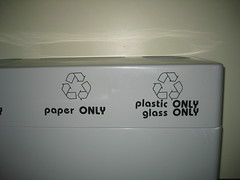Getting up, heading to IG Chair meeting, then getting ready for the BIGWIG Social Software Showcase: http://showcase.litablog.org
@msauers: Are you spying on me…
@msauers: Are you spying on me? I literally JUST BOUGHT THAT BOOK at KramerBooks in DC. Seriously. 30 Minutes ago.
@librarianaaron: the Brickskel…
@librarianaaron: the Brickskeller isnt BIGWIG sponsored, just fun and frivolity
Waste not…
So that photo is of the top of a trashcan on Friday at ALA Annual 2007. Why did I take a picture, you may ask yourself (this is not my beautiful house!)?
Because on top of the can are the contents of two of the bags that ALA distributes to every registered attendee. This was not an isolated incident…I have seen at least a dozen or so of these piles of paper, and I myself immediately tossed everything except the included map of DC. Probably 2 pounds of paper in every bag. There has got to be a better way of doing this, ALA.
Going to turn on Twitter2Blog for the extent of the ALA conference, to make it easier for me to post/keep up with things. If it falls apart and I don’t notice, someone let me know. 🙂
That word….
Gorman: the Musical!
David Lee King has just unleashed upon the world a song of such touching complexity, I expect major labels to be contacting him any day.
Brilliant, and funny. However, David, where is the Garageband file so that we can all remix it??
Griffey @ ALA 2007
More on He Who Must Not Be Named
More great writing on Gorman from:
Shirky FTW!
Clay Shirkey with a brilliant, well-reasoned reply to Gorman, for the win!
He even makes the same analogy I did regarding translations of the Bible. 🙂
If Gorman were looking at Web 2.0 and wondering how print culture could aspire to that level of accessibility, he would be doing something to bridge the gap he laments. Instead, he insists that the historical mediators of access “…promote intellectual development by exercising judgment and expertise to make the task of the seeker of knowledge easier.†This is the argument Catholic priests made to the operators of printing presses against publishing translations of the Bible — the laity shouldn’t have direct access to the source material, because they won’t understand it properly without us. Gorman offers no hint as to why direct access was an improvement when created by the printing press then but a degradation when created by the computer. Despite the high-minded tone, Gorman’s ultimate sentiment is no different from that of everyone from music executives to newspaper publishers: Old revolutions good, new revolutions bad.
More excellent responses at:
- Free Range Librarian
- Information Wants to be Free
- Wandering Eyre
- David Lee King
- librarian.net
- Caveat Lector





